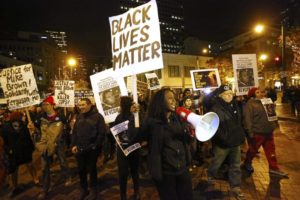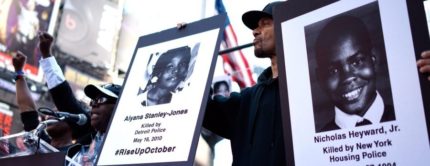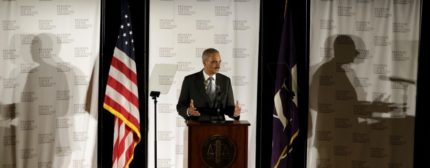
Protesters marching through the streets of Ferguson. Image courtesy of the Seattle Times.
Police departments across the nation have collectively shelled out nearly $4.75 million in cold hard cash on software used to surveil the social media activity of prominent activists and suspects, according to new research.
The study by the Brennan Center for Justice, a New York-based nonprofit group focused on issues in criminal justice, tracked the spending of 151 local law enforcement agencies who purchased user data from social media giants like Facebook, Twitter and Instagram.
The practice of social media surveillance by law enforcement has gained steam in recent years, as police utilize new software to monitor trends, criminal activity and even protests. But the covert tracking has some people worried that police are now abusing their power by monitoring social demonstrations and targeting specific protesters.
“The numbers we have are massively understated,” Faiza Patel, co-director of the center’s liberty and national security program, told The Washington Post. “But it gives an indication of a phenomenon that is growing rapidly and flying under the radar.”
According to the center’s research, the city of Los Angeles, the Texas Department of Public Safety, the County of Sacramento, the Florida Department of Law Enforcement and the County of Macomb in Michigan were the top spenders of surveillance software. Each agency spent about $70,000 tracking social media over the past three years.
Tech start-ups like Geofeedia, SnapTrends and Dataminr have appeared in recent years to purchase user data from social media websites and then analyze it to find popular trends, topic and events. That information is then passed along to corporations, nonprofit groups, financial firms and now, law enforcement, for a price, The Washington Post reported.
Earlier this year, the ACLU blasted Facebook, Twitter and Instagram for providing such user information to police agencies, for fear that it was being used to spy on Black activists. The organization asserted that data provided by startups like Chicago-based Geofeedia made it that much easier for law enforcement to monitor social media activity and hashtags used by prominent Black activists and allies.
“Further steps are required if these companies are to live up to their principles and policies by protecting users of all backgrounds engaging in political and social discourse,” the ACLU report read. “So, today, the ACLU of California, the Center for Media Justice and Color of Change are calling on Twitter, Facebook and Instagram to commit to concrete changes to better protect users going forward.”
Law enforcement officials have defended their use of the surveillance software and said it has helped them catch criminals who sometimes brag about their crimes online. Social media is also a forum where witnesses often offer up clues about where and when a crime took place.
Despite the benefits of social media tracking, the Brennan Center and other advocates still aren’t convinced it won’t be used to spy on protesters, especially since police agencies aren’t obligated to disclose their use of surveillance software.
The International Association of Police Chiefs reported that nearly 50 law enforcement agencies across 44 states use tracking tools to gather intelligence. Such tools have recently been used to track racially charged protests in Ferguson, Missouri, and Baltimore, Maryland.
Patel expressed fear that this sort of tracking might intensify under the leadership of President-elect Donald Trump.
“Today, the main way protesters organize is online,” she said. “This is a new administration that has been frankly threatening to the act of political protest.”

